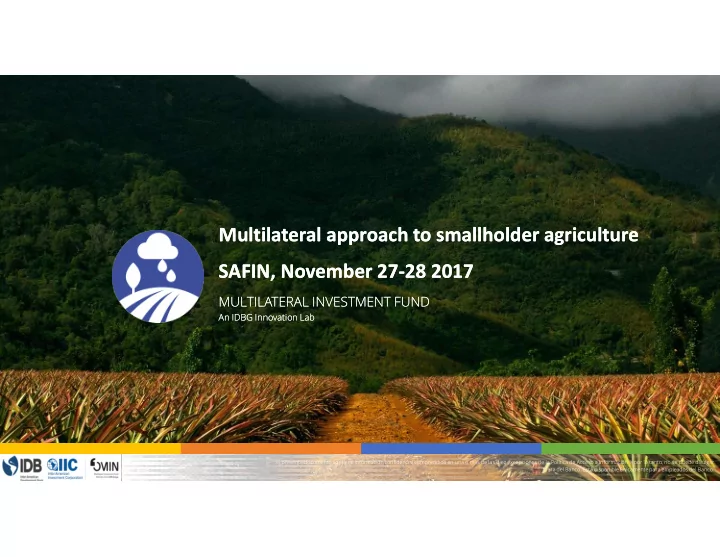

Multilateral approach to smallholder agriculture Multilateral approach to smallholder agriculture SAFIN, November 27-28 2017 SAFIN, November 27-28 2017 MULTILATERAL INVESTMENT FUND MULTILATERAL INVESTMENT FUND An IDBG Innovation Lab An IDBG Innovation Lab El presente documento contiene información confidencial comprendida en una o más de las diez excepciones de la Política de Acceso a Información y, por lo tanto, no se puede divulgar fuera del Banco. Está disponible únicamente para empleados del Banco.
Agriculture in LAC LAC Ag sector represents16% of World exports in the sector, 14% of the employment in the Region. Recent studies project that it will exceed Regional demand by 166% by 2030. 25% of rural populations in LAC still live on 2$/día. And the productivity gap is still large and growing. TFP in Ag has grown 40% slower in LAC than in Developed countries. Innovation rate is low. Change in land use accounts for 40-60% of carbon (CO2e) emissions. Climate change is a risk to output; recent estimates of 1.3 years of Ag output will be lost over 10 years. Sources: The next global breadbasket, IDB; The climate and development challenge in LAC, IDB; Development Indicators, World Bank; Statistical Yearbook, ECLAC
IDBG work in Agriculture Regulatory environment IDB Climate action R&D and Innovation Policy Public and club goods Risk and finance (Dev. Banks) Development of value chains Agribusiness finance Export finance Infrastructure Financial Intermediaries Smallholder MIF Test innovative models IDB Alternative/blended finance Invest Disruption and Agtech Natural capital & climate Smallholders in value chain
Main clients and partners Public sector Government (national, state and local) IDB Development Banks (including specialized in Ag) Ministries of agriculture, environment, etc State-sponsored research institutions Private, corporates Agribusiness firms—ag inputs, producers, ag services IDB Commodity traders Invest Large ag or credit cooperatives Private Banks, established MFIs, other financial intermediaries Private, innovation-driven Financial intermediaries Early-stage fund mangers/investors MIF Development-oriented corporates, cooperatives NGOs, Foundations and bilateral aid agencies Agriculture firms, particularly agtech Select state agencies, state-sponsored development funds
Demand from climate change will impact future oppotunities Agriculture/Land use 3% Others 16% Agriculture and Land use account Transport for between 40-60% de CO2e 22% And only 3% of new financing in LAC Area. Emergy 28% Renewables 29% Water 2% Source: Joint multilateral climate change investment reporting
Demand from private sector will continue to drive innovation Trends: US R&I in Ag, public and private 18 0.8 (billions 2013 USD and share) 16 0.7 Private’s share of investment in Ag has increased dramatically, reaching 14 0.6 75% in US, developing countries lower 12 0.5 10 Most research confirms 0.4 complementarity between public and 8 private investment 0.3 6 0.2 4 Percentage private in non-traded commodities still limited 0.1 2 0 0 Public R&D funding Private R&D funding Private's share Source: USDA ESR
PECSA -Pecuária Sustentável da Amazonia A new deforestation-free model for cattle BR-L1494 PECSA – Pecuária Sustentável da Amazonia , is a sustainable cattle ranching B-corp operating in Brazilian Amazon. It works with small and medium-sized farmers to restructure and sustainably intensify their cattle ranching model, implementing a set of agronomical, biotech, and digital applications, including drones mapping, animal traceability and satellite environmental monitoring, as well as forest and ecosystem restoration. Impact Partners Financing 3X increase in net income of MIF’s Contribution 38% US$2.500.000 participating ranchers 7X increase in productivity (kg beef Co-investment 62% US$ 4.000.000 per hectare) 3ha hectares of avoided deforestation Total Project 100% per hectare of treated land. US$6.500.000 The image part with relationship ID rId2 was not found in the file.
Climate-Smart financial inclusion Access to resilient technologies for small producers in the AR-T1170 Argentine Non-Pampas region The project introduces new technological solutions to changes in temperature and rainfall due to climate change in the poorest regions of Argentina., by working with the largest cooperative Bank in the country. It is integrated with conditional cash transfer programs for producers, with partial loan write-offs for those who adopt qualifying technologies. Impact Financing Partners Total MIF financing 800 producers access new 27% US$1.000.000 technologies to reduce vulnerability to climate change Counterpart financing 27% US$1.949.000 2000 new clients obtain financing for resilient technologies throughout the Other partners 46% US$750.000 regions served by Credicoop 5.000 new loans issued by the end of the Project 20% improved yield due to the Total Project 100% adoption of new technologies US$3.699.000 The image part with relationship ID rId2 was not found in the file.
Aluprot, superfood Ancestral techniques for climate resilience in chile CH-T1181 To counteract the soil erosion associated with climate change in the Araucania region of Chile, this project will work with Mapuche cooperatives to produce a climate-resistant plant called AluProt-CGNA. This climate-friendly, high-yield "super-food" in the global marketplace has great potential to increase productivity and income in the area. Likewise, the adoption of a rotation technology will promote a higher value-added economy. Impact Budget Partners MIF Contribution 33% 2.000 Mapuche farmers adopt US$1.300.000 climate-resilient technology Local counterpart 26% US$1.044.000 50% annual increase in sales of AluProt-CGNA Others counterpart 16% US$629.000 20% annual increase in productivity Reimbursable cofinancing 25% US$1.000.000 30% improvement in the soil Total Project 100% resilience index US$3.973.000 The image part with relationship ID rId2 was not found in the file.
Thank you 10
Recommend
More recommend